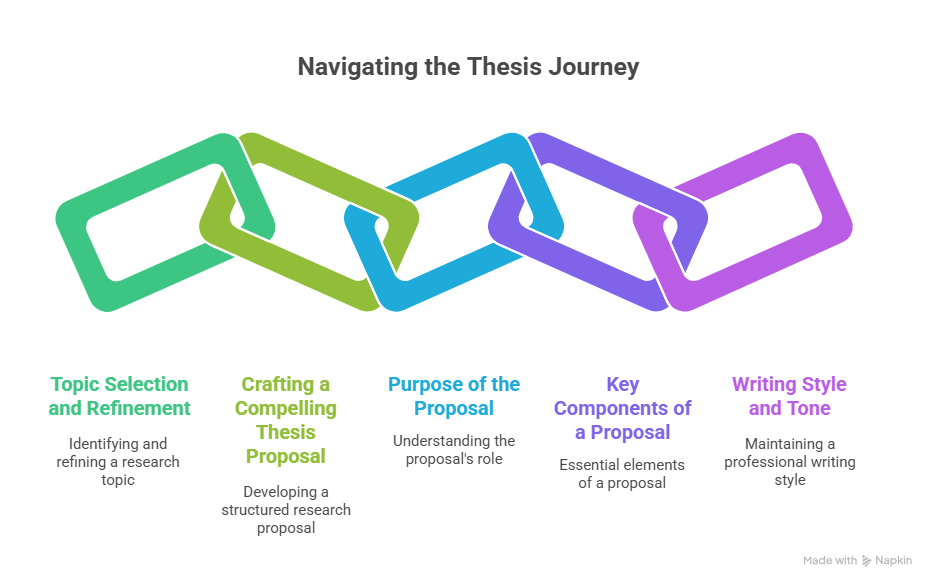Crafting a thesis is, without doubt, one of the most significant, intellectually demanding, and often daunting academic undertakings for students pursuing Master’s and Doctoral degrees in India. It transcends the mere act of producing a long paper; it’s a profound, immersive journey that demands meticulous, systematic research, incisive critical thinking, sophisticated academic writing, rigorous methodological application, and unwavering perseverance. Without a truly structured, comprehensive, and accessible thesis writing guide, many bright and ambitious students find themselves utterly overwhelmed by the sheer volume of work, the stringent academic standards, the nuanced expectations of their supervisors, and the labyrinthine pathways of scholarly inquiry.
This definitive thesis writing guide has been meticulously designed and curated to demystify the entire thesis creation process, providing a clear, actionable, and exhaustive roadmap from the nascent stages of ideation and proposal development to the triumphant moment of successful, confident submission. This thesis writing guide will serve as your indispensable companion, ensuring you navigate each complex stage with unparalleled confidence, absolute clarity, and robust competence, ultimately leading to a publishable-quality academic work.
Table of Contents
The Essential Components of a Definitive Thesis Writing Guide: A Deep Dive into Structure and Content
A truly comprehensive thesis writing guide doesn’t just offer superficial advice; it meticulously breaks down the entire thesis creation process into logical, actionable, and less intimidating steps. Here’s what a top-tier thesis writing guide should always meticulously cover, chapter by chapter, concept by concept:
1. Laying the Foundational Pillars: Your Initial Thesis Writing Guide Steps
- 1.1 Topic Selection and Refinement: The Cornerstone of Your Research
- Defining a Research Problem: This section of the thesis writing guide would elaborate on how to identify a genuine research problem. It’s not just about a broad area, but a specific, unresolved issue or gap in existing knowledge that your thesis will address. The thesis writing guide would provide techniques like “problem mapping” or “literature gap analysis.”
- Brainstorming & Initial Exploration: Strategies for brainstorming ideas, mind mapping, and discussing nascent concepts with peers and potential supervisors.
- Feasibility Assessment (The “F.I.N.E.R.” Criteria): A critical aspect often overlooked. This thesis writing guide would detail the F.I.N.E.R. criteria (Feasible, Interesting, Novel, Ethical, Relevant) to evaluate potential topics.
- Feasibility: Is the data accessible? Do you have the resources (time, money, skills)?
- Interest: Are you genuinely passionate about it? Sustained motivation is key.
- Novelty: Does it add something new to the field, or is it a significant replication?
- Ethics: Can it be conducted ethically? What are the IRB/ethics committee requirements?
- Relevance: Does it contribute to theory, practice, or policy?
- Narrowing Down Your Focus: Techniques for transforming a broad topic into a specific, manageable research question. This thesis writing guide would include examples of how to refine a topic like “climate change” into “The Impact of Microfinance on Climate Change Adaptation Strategies among Rural Women in Coastal Odisha.”
- 1.2 Crafting a Compelling Thesis Proposal: Your Research Blueprint
- Purpose of the Proposal: Why is it crucial? This thesis writing guide explains it as a contract, a planning document, and a tool for gaining approval and feedback.
- Key Components of a Proposal:
- Title: Clear, concise, and indicative of content.
- Introduction/Background: Establishing the context, problem statement, and rationale.
- Literature Review (Preliminary): Highlighting key studies and gaps your research will fill. This thesis writing guide stresses that this isn’t exhaustive but indicative.
- Research Questions/Hypotheses: Specific, measurable, achievable, relevant, time-bound (SMART).
- Methodology: Detailing design, participants/sampling, data collection instruments, data analysis plan. This is where your thesis writing guide starts getting granular.
- Ethical Considerations: Outlining how participant rights, confidentiality, and data security will be ensured.
- Timeline/Gantt Chart: A realistic schedule for completion.
- Budget (if applicable): Resource allocation.
- References: Preliminary list of sources.
- Writing Style & Tone: Professional, persuasive, and academic. This thesis writing guide would offer templates and examples for each section, making proposal writing less intimidating.
2. Mastering Research Methodologies: The Intellectual Core of Your Thesis Writing Guide
- 2.1 The Art of the Literature Review: Beyond Mere Summary
- Purpose: Not just what has been said, but what needs to be said. This thesis writing guide explains how to identify theoretical gaps, empirical gaps, and methodological gaps.
- Systematic Searching & Curation: Strategies for using academic databases (JSTOR, Scopus, Web of Science, Google Scholar), citation management tools (Zotero, Mendeley, EndNote), and developing effective search strings.
- Critical Analysis vs. Summary: How to evaluate sources for credibility, relevance, and contribution. This thesis writing guide provides frameworks for critical appraisal (e.g., assessing methodology, findings, limitations).
- Synthesizing & Thematic Grouping: Moving beyond individual papers to identify overarching themes, debates, and schools of thought. A good thesis writing guide shows how to create conceptual frameworks or theoretical models based on the literature.
- Identifying Your Research Niche: How the literature review directly leads to the justification of your research questions and the unique contribution of your thesis. This is a critical link often highlighted by this thesis writing guide.
- 2.2 Designing Robust Methodology: The Blueprint for Your Inquiry
- Philosophical Underpinnings: This advanced thesis writing guide would briefly introduce research paradigms (Positivism, Interpretivism, Pragmatism, Critical Theory) and their influence on methodological choices.
- Research Design Selection:
- Quantitative Designs: Experimental (pre/post-test, control groups), Quasi-experimental, Correlational, Survey Research. This thesis writing guide would detail their strengths, weaknesses, and appropriate use cases.
- Qualitative Designs: Phenomenology, Grounded Theory, Ethnography, Case Study, Narrative Inquiry. Detailed explanation of each, including their aims and data types.
- Mixed Methods Designs: Explaining sequential (exploratory, explanatory) and convergent designs.
- Sampling Strategies:
- Probability Sampling: Simple Random, Stratified, Systematic, Cluster. How to ensure representativeness.
- Non-Probability Sampling: Convenience, Purposive, Snowball, Quota. Their use in qualitative research. This thesis writing guide discusses sample size considerations for both quantitative and qualitative studies.
- Data Collection Instruments & Procedures:
- Questionnaire Design: Open vs. closed questions, Likert scales, semantic differential scales, pilot testing.
- Interview Techniques: Structured, semi-structured, unstructured. Probing, active listening, recording methods.
- Observation: Participant vs. Non-participant, structured vs. unstructured.
- Document Analysis: Archival research, content analysis of texts.
- Experimental Procedures: Control variables, manipulation, measurement.
- Ensuring Validity & Reliability/Trustworthiness:
- Quantitative: Internal, external, construct validity; test-retest, inter-rater reliability.
- Qualitative (Trustworthiness): Credibility, transferability, dependability, confirmability. This thesis writing guide provides practical tips for achieving these.
- Data Analysis Plan: Specifying the exact statistical tests (e.g., ANOVA, regression, factor analysis, correlation) or qualitative analysis approaches (e.g., thematic analysis, content analysis, discourse analysis) to be used. This is where your thesis writing guide becomes a technical manual.
- Ethical Considerations in Depth: Informed consent, anonymity, confidentiality, right to withdraw, debriefing, data storage, potential harm, IRB/ethics committee application process. This thesis writing guide cannot stress ethical conduct enough.
Chapter-by-Chapter Writing: A Detailed Thesis Writing Guide Walkthrough
This thesis writing guide provides a systematic walkthrough of each core chapter, transforming the vast writing task into manageable, high-quality segments.
- 3.1 The Introduction: Setting the Stage for Your Scholarly Contribution
- Opening Hook: Grabbing the reader’s attention.
- Background to the Problem: Broad context, narrowing to specific issue.
- Problem Statement: Clearly articulating the research gap or unsolved issue. This is the heart of your introduction, emphasized by your thesis writing guide.
- Rationale/Significance of the Study: Why is this research important? Who benefits? (Theoretical, practical, policy implications).
- Research Questions/Hypotheses: Re-stating them clearly and concisely.
- Objectives of the Study: What your research aims to achieve.
- Scope & Delimitations: What your study covers and what it specifically does NOT cover.
- Limitations of the Study (anticipated): Acknowledging potential weaknesses upfront.
- Definition of Key Terms: Operational definitions of important concepts.
- Organization of the Thesis: A roadmap of the subsequent chapters.
- Word Count Expansion: For each point, provide 2-3 examples of strong vs. weak phrasing, common pitfalls to avoid (e.g., making grand claims without evidence, simply listing points without flow), and tips for maintaining a cohesive narrative. Your thesis writing guide would include a checklist for a strong introduction.
- 3.2 Literature Review: Building Your Scholarly Foundation (Dedicated Chapter)
- Beyond Summary: Synthesis and Critique: Emphasizing that this chapter is an argument, not a bibliography. The thesis writing guide would provide templates for “topic sentences” that introduce themes, not just authors.
- Thematic vs. Chronological Organization: When to use each, and how to create logical flow.
- Identifying Theoretical Frameworks: Explaining how to articulate the theories that underpin your research and how your study engages with them.
- Argumentation and Voice: How to integrate sources while maintaining your own scholarly voice and argument. The thesis writing guide provides examples of how to agree, disagree, extend, or refine previous research.
- Concluding the Literature Review: Clearly identifying the “gap” that your research will fill, leading directly into your methodology.
- Word Count Expansion: Detailed examples of synthesis tables, matrices for comparing studies, and transition phrases. Common errors (e.g., “laundry list” reviews, biased selection of sources) and how this thesis writing guide helps avoid them.
- 3.3 Methodology: The Science Behind Your Claims (Dedicated Chapter)
- Re-statement of Research Design: Briefly reiterate the chosen design and its philosophical grounding.
- Participants/Sampling Procedures: Detailed description of selection criteria, recruitment process, sample size justification.
- Research Setting: Where the study was conducted, relevant context.
- Instrumentation: Detailed description of every data collection tool (questionnaires, interview guides, observation protocols, lab equipment). Include validity and reliability information.
- Data Collection Procedures: Step-by-step account of how data was gathered, including timeline and any challenges faced.
- Data Analysis Procedures: In-depth explanation of every analytical step. For quantitative: software used, specific tests, assumptions, handling of missing data. For qualitative: transcription, coding process, thematic analysis steps, software (NVivo/ATLAS.ti).
- Ethical Considerations (revisited): Specific safeguards implemented during the study.
- Word Count Expansion: Provide flowcharts for different methodological approaches. Include sample interview questions or survey item types. Detail specific statistical tests, their assumptions, and how to report results. For qualitative methods, explain the iterative process of coding and theme development. This thesis writing guide emphasizes transparency and replicability.
Ensuring Uncompromised Quality and Originality with Your Thesis Writing Guide
A vital and non-negotiable aspect of any effective thesis writing guide is its absolute emphasis on academic integrity and the highest quality standards. This thesis writing guide rigorously stresses the importance of:
- 4.1 Mastering Plagiarism Prevention and Ethical Citation:
- Understanding Different Types of Plagiarism: Direct, mosaic, self-plagiarism, improper paraphrasing.
- Deep Dive into Citation Styles: Detailed instructions for APA, MLA, IEEE, Harvard, Chicago, Vancouver – including formatting for in-text citations, reference lists, and different source types (books, journal articles, websites, conference proceedings, patents, software). Your thesis writing guide would include specific examples for each.
- Effective Paraphrasing and Summarizing: Techniques for extracting core ideas without copying, maintaining original meaning while using your own voice. This thesis writing guide provides practical exercises for this skill.
- The Role of Quotations: When to use direct quotes, how to integrate them smoothly, and proper formatting.
- Utilizing Plagiarism Detection Software: Encouraging proactive use of tools like Turnitin, iThenticate, or Urkund to check one’s own work before submission. This thesis writing guide instills a culture of academic integrity.
- 4.2 The Art of Editing and Proofreading: The Final Polish:
- Multi-Stage Editing Process:
- Structural Editing: Ensuring logical flow, coherent arguments, and appropriate chapter organization.
- Content Editing: Checking for clarity, precision, accuracy, and depth of analysis.
- Stylistic Editing: Enhancing readability, tone, conciseness, and academic voice.
- Copyediting: Correcting grammar, spelling, punctuation, and consistency in style.
- Proofreading: The final read-through for any lingering errors before submission.
- Tools and Techniques: Using spell-checkers, grammar checkers (Grammarly), but emphasizing manual review. Reading aloud, printing out to spot errors, getting a fresh pair of eyes. This thesis writing guide provides a comprehensive editing checklist.
- Professional Proofreading Services: When to consider external help for that final, flawless polish, particularly if English is not your first language.
- Multi-Stage Editing Process:
- 4.3 Leveraging Data Analysis Tools: From Raw Data to Meaningful Insights:
- Quantitative Software:
- SPSS: Detailed guide on data entry, running descriptive statistics, t-tests, ANOVA, regression, correlation, factor analysis. Interpreting output.
- R/Python: Introduction to statistical programming, common packages (tidyverse, pandas, numpy, scipy), visualization (ggplot2, matplotlib).
- Stata/EViews/SAS: Brief overview for specific fields.
- Qualitative Software:
- NVivo/ATLAS.ti: How to import data, create nodes/codes, code narratives, perform thematic analysis, identify relationships between codes.
- Understanding Assumptions and Limitations: Crucial for correct application and interpretation of results. This thesis writing guide stresses that choosing the right tool is as important as knowing how to use it.
- Quantitative Software:
The PhDiZone Advantage: Supplementing Your Thesis Writing Guide for Peak Performance and Unrivaled Success
While a meticulously crafted thesis writing guide provides an essential theoretical framework and general directions, many students significantly benefit from additional, personalized, and expert-level support tailored to their unique research challenges. This is precisely where specialized services like PhDiZone can profoundly complement and enhance your self-guided efforts, effectively extending the practical reach and intellectual depth of your personal thesis writing guide. PhDiZone offers expert assistance that aligns perfectly with, and builds upon, the core principles outlined in this robust thesis writing guide:
- Expert Consultation Beyond the Guide :
- When your thesis writing guide leaves you with highly specific, nuanced questions, methodological dilemmas, or complex conceptual challenges, PhDiZone’s seasoned PhD experts can provide precise, tailored advice and strategic insights that a generic guide, by its very nature, cannot. This includes one-on-one sessions, brainstorming discussions, and problem-solving guidance for unexpected research roadblocks. They act as mentors, offering bespoke solutions.
- Targeted Chapter-wise Support :
- If you find yourself conceptually stuck or procedurally stalled on a particular section of your thesis – be it the elusive literature review, the intricate methodology, or the demanding discussion chapter – PhDiZone assistance can provide the critical push needed to move forward. They offer structured support for specific chapters, helping you to fill in gaps, refine arguments, and ensure seamless transitions, effectively extending your unique thesis writing guide into practical, real-time application for your specific research.
- Advanced Technical Assistance:
- For the most complex data analysis, experimental design, or coding challenges (e.g., advanced statistical modeling, psychometric validation, large dataset management, complex qualitative coding schemes), PhDiZone provides hands-on, expert help with statistical software and methodological design. This direct, practical assistance transforms abstract concepts from your thesis writing guide into concrete, correct analytical outputs, ensuring the integrity and validity of your research findings.
- Comprehensive Editing & Polishing :
- Beyond mere surface-level proofreading, PhDiZone offers professional, multi-layered editing services that meticulously ensure your language, argumentative flow, and overall structure adhere to the absolute highest academic standards. They refine your prose for clarity, conciseness, and impact, ensuring your work is polished to perfection, ready for rigorous academic scrutiny, just as the most demanding thesis writing guide would advise.
- Viva Voce Preparation & Defense Coaching :
- For Master’s and particularly PhD scholars, the final viva voce examination can be a daunting and nerve-wracking experience. PhDiZone helps you prepare thoroughly for this critical defense. This includes anticipating potential questions from examiners, honing your presentation skills, articulating your research contributions confidently, and practicing your responses to challenging inquiries. This crucial, often overlooked, aspect of a complete thesis writing guide empowers you to face your defense with assurance.
Frequently Asked Questions (FAQs)
-
What is the purpose of a thesis writing guide from PhDiZone?
A thesis writing guide from PhDiZone offers structured assistance for planning, writing, and finalizing a thesis. It helps scholars meet academic standards, understand methodology, and apply effective writing techniques. -
Is the PhDiZone thesis writing guide suitable for both Master’s and PhD students?
Yes. The PhDiZone thesis writing guide is designed to support both Master’s and PhD-level scholars. While requirements may vary, the guide covers universally applicable steps for academic writing in India. -
Can I use the PhDiZone thesis writing guide for interdisciplinary research?
Absolutely. The PhDiZone guide supports interdisciplinary research across domains such as humanities, engineering, sciences, and social sciences by focusing on core academic writing principles. -
How does the PhDiZone thesis writing guide help prevent plagiarism?
The guide from PhDiZone emphasizes ethical writing practices, including proper citation styles, paraphrasing techniques, and the use of advanced plagiarism detection tools to maintain research originality. -
Do I still need expert assistance if I use the PhDiZone thesis writing guide?
Yes. While the PhDiZone thesis writing guide offers a complete framework, expert assistance is recommended for customized help—such as technical writing, statistical analysis, or university-specific formatting.
Conclusion:
Embarking on the journey of thesis writing is undoubtedly a demanding yet profoundly rewarding intellectual endeavor. With a robust, meticulously followed thesis writing guide by your side, you gain the clarity and direction needed to systematically approach each intricate stage, ensuring the production of a high-quality, original, and impactful piece of academic research. This comprehensive thesis writing guide is designed to be your unwavering companion, empowering you to navigate the intellectual complexities, methodological challenges, and demanding writing phases with unwavering confidence and ultimate success.
Remember, a truly comprehensive thesis writing guide is not just about the technical act of writing itself; it’s fundamentally about guiding you to evolve into a skilled, discerning, and ethical researcher and a capable academic. It’s about equipping you with the tools to critically engage with existing knowledge, formulate novel research questions, execute rigorous methodologies, and effectively disseminate your unique contributions to your field. Your journey to unparalleled academic excellence begins, is sustained, and ultimately thrives with this definitive thesis writing guide. Embrace its wisdom, leverage its strategies, and confidently make your mark on the world of scholarship.











